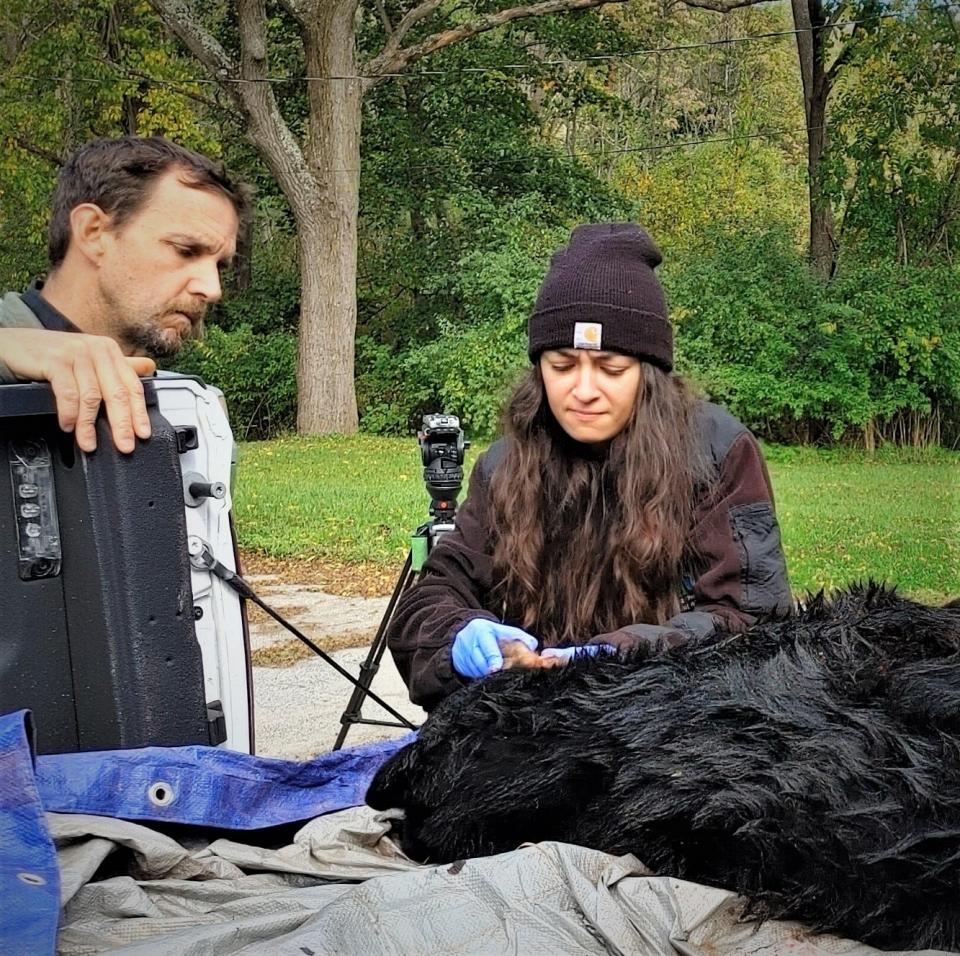Bear hunt shows shows slight increase over last time in NJ at halfway point
This year's black bear archery season is half over and the number of bears killed is slightly higher than the first three days of 2020, the last time there was an archery season in New Jersey.
Through Wednesday, there were 209 bears brought to official check-in stations, according to numbers posted by the Division of Fish and Wildlife. Through the first three days of the 2020 hunt, there had been 201 bears inspected at one of the five check stations.
The 2020 archery season, conducted Oct. 12 to 17, saw a total of 336 bears killed, a "harvest rate" of 7.1%. The harvest rate through three days this year is at 9.8%.
That number is determined by the number of bears taken which had special ear tags and the number of tagged bears is based on the estimated population of black bears in the northwestern part of the state where bear hunting is allowed. This year, there were 163 such tagged bears while in 2020, the number was 141.

In the months before the hunt, bears are live-trapped and the metal tags attached to the animal's ear. At the same time, wildlife biologists also tattoo the same tag number inside the animal's lip. The number of bears which are tagged - 141 in 2020 - is based on a percentage of the estimated population.
At the check station, the tattoo and ear tag numbers are recorded. The system is based on a percentage of the estimated population and determines the "harvest rate."
Under the system, if 30% of tagged bears are among the bears brought to a check station, the hunt is stopped. If less than 20% are harvested by the end of the shotgun season in December, the hunt can be extended by up to four days.
Through the first half of this year's six-day archery season, 16 "tagged" bears have been brought to a check station.
As it has for all bear hunts conducted over the past decade, Sussex County leads in the number of bears killed at 96. Warren County - along with Sussex the only two counties entirely within the bear-hunt region - follows with 66 bears killed. Morris County, of which most is within the hunting zone had 31 reported, followed by Passaic at 10 and Hunterdon at 6. There were no reports of bears taken in Bergen, Mercer or Somerset counties.
In 2020, the archery season accounted for a harvest rate of 10.6% and at the end of the shotgun season - extended by four days - the rate was 13.4%.
Studies by wildlife biologists over the decades has determined that taking 20% of a wildlife species population through an annual hunt can stabilize the species population. Exceeding 30% would lead to a decline of the population if allowed to go for several years.
In 2020, 336 bears were taken by archery in October and just 74 were killed during the December shotgun season which was extended to 10 days. The overall harvest rate that year was 13.4%.
NJ news Check your bank accounts: ANCHOR payments go out today in NJ
On opening day, Assistant Commissioner Dave Golden, who heads the Division of Fish and Wildlife, said the hunts are designed to slow the expanding bear population, noting that the northwestern part of New Jersey has one of the densest populations of black bears in the country.
There were no hunts in 2021 and bear-human conflict numbers rose. There was an emergency 10-day shotgun hunt last December with 114 bears killed and reports of bear encounters have shown a decrease this year.
The latest monthly report, through Sept. 21, shows the number of calls made to the DEP have dropped by 35.5% over 2022 numbers. Category 1 calls, the most serious, dropped nearly 50% from 185 for the first nine months of 2022 to 93 this year.
Golden said a bear hunt was part of the reason as well as educating the public on ways to reduce bear incidents through better garbage control as well as what is "normal" bear behavior.
While bear complaints continue to be the highest category of animal complaints received by the department, the latest complaint report lists 28 species, including three "unknown."
The 117 bear complaints is highest, followed by 91 coyote, 89 deer and 80 fox. The list does include one complaint each about a snake, gull, frog, hornets, turtle and alligator.
This article originally appeared on New Jersey Herald: NJ bear hunt reaches over 200 kills at halfway point

